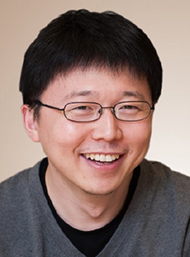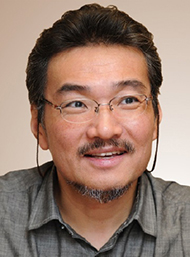The 2018 Keio Medical Science Prize Awardees
Feng Zhang, Ph.D.

- James and Patrcia Poitras Professor of Neuroscience, Massachusetts Institute of Technology
- Core Institute Member, The Broad Institute of MIT and Harvard
* website
http://zlab.mit.edu/
Reasons for Selection and His Major Achievement:
Development of CRISPR/Cas system in mammalian cells
and application for medical science
The CRISPR/Cas system has greatly facilitated our ability to make precise changes to the genomes of living cells, and has rapidly become one of the most powerful and indispensable functional genomics tools. Multiple research groups contributed to the elucidation of the molecular mechanisms underlying CRISPR/Cas systems. It was Dr. Feng Zhang who first used the CRISPR/Cas system to edit a mammalian genome in January 2013. Since that time, he has led the gene editing field in two critical directions: advancing our understanding of CRISPR/Cas biology, and developing a versatile CRISPR toolbox. Dr. Zhang’s contributions in these areas are immeasurable, as the ability to precisely edit the genome of a living cell holds enormous potential to accelerate life science research, improve biotechnology, and potentially treat human disease. Dr. Zhang has also trained many researchers in the use of CRISPR/Cas technology through direct education and by sharing CRISPR/Cas components with academic laboratories around the world to help accelerate global research aimed at benefiting human health.
Background
Education
- 2000 – 2004
- A.B., Chemistry and Physics, Harvard College, Cambridge, MA
- 2004 – 2009
- Ph.D., Chemistry, Stanford University, Stanford, CA
Positions
- 1997 – 1999
- Research Assistant with John P. Levy, Ph.D.
Human Gene Therapy Research Institute, Des Moines, IA - 2000 – 2001
- Research Assistant with Don C. Wiley, Ph.D.
Dept. of Molecular and Cellular Biology, Harvard University, Cambridge, MA - 2002 – 2004
- Research Assistant with Xiaowei Zhuang, Ph.D.
Dept. of Chemistry and Chemical Biology, Harvard University, Cambridge, MA - 2004 – 2009
- Graduate Student with Karl Deiseroth, Ph.D.
Department of Bioengineering, Stanford University, Stanford, CA - 2009 – 2010
- Junior Fellow, Harvard Society of Fellows, Cambridge, MA
- 2011 –
- Core Member, Broad Institute of MIT and Harvard
Investigator, McGovern Institute for Brain Research at MIT
W. M. Keck Career Development Professor in Biomedical Engineering,
Departments of Brain and Cognitive Sciences and Biological Engineering,
Massachusetts Institute of Technology, Cambridge, MA - 2015 –
- Robertson Investigator, New York Stem Cell Foundation
- 2016 –
- Associate Professor (with tenure) of Neuroscience and Biological Engineering, MIT, Cambridge, MA
- 2017 –
- James and Patricia Poitras Professor in Neuroscience at MIT
- 2018 –
- Investigator, Howard Hughes Medical Institute
Major Honors/Awards
- 2016
- Canada Gairdner International Award
- 2016
- Tang Prize
- 2017
- Blavatnik Award for Young Scientists – National Award Winner
- 2017
- Albany Medical Center Price in Medicine and Biomedical Research
- 2017
- Lemelson-MIT Prize
Comments from Professor Zhang
I am greatly honored and humbled to receive the Keio Medical Science Prize, which has been awarded to many brilliant scientists over the years. Having the work that my team and I have done to develop genome editing tools recognized in this way is an incredible distinction, and it inspires us to do even more to find ways to improve human health. On behalf of all the scientists that have contributed to this discovery, thank you.
Masashi Yanagisawa, M.D., Ph.D.

・Director and Professor, International Institute for Integrative Sleep Medicine (WPI-IIIS), University of Tsukuba
Reasons for Selection and His Major Achievement:
Elucidation of sleep control mechanisms and applications in drug discovery
Dr. Masashi Yanagisawa has made pioneering advances in understanding the mechanisms that control sleep, and his research has contributed to the discovery of new drugs. In 1991, Dr. Yanagisawa discovered the novel neurotransmitter orexin, an endogenous ligand for orphan G protein-coupled receptors. On further study, he found that orexin controls the sleep/wake cycle; mice with the orexin gene deleted exhibited symptoms of sleeping disorders, such as narcolepsy. Orexin receptor antagonists have since been developed and marketed by pharmaceutical companies as anti-insomnia medicines. Dr. Yanagisawa has also identified new sleep control genes using mouse forward genetics methods. A deeper understanding of the molecular basis of sleep control, may lead to new breakthroughs in the development of treatments for sleep disorders, and the contribution of Dr. Yanagisawa to this field merits international recognition.
Background
Education and Professional Appointments
- 1960
- Born in Tokyo, Japan
- 1985
- M.D. (summa cum laude), University of Tsukuba
- 1988
- Ph.D. in Medical Sciences, University of Tsukuba
- 1988 – 1989
- Postdoctoral fellow, Department of Pharmacology, University of Tsukuba
- 1989 – 1991
- Assistant Professor of Pharmacology, University of Tsukuba
- 1991 – 1991
- Assistant Professor of Pharmacology, Kyoto University School of Medicine
- 1991 – 1996
- Associate Professor of Molecular Genetics; Associate Investigator, Howard Hughes Medical Institute
University of Texas Southwestern Medical Center at Dallas (UTSW) - 1996 – 2014
- Professor of Molecular Genetics, UTSW; Investigator, HHMI
- 1998 – 2014
- The Patrick E. Haggerty Distinguished Chair in Basic Biomedical Science, UTSW
- 2001 – 2007
- Director, Yanagisawa Orphan Receptor Project (JST/ERATO)
- 2010 – 2014
- Professor and Director, FIRST program, University of Tsukuba
- 2012 – Present
- Professor and Director, International Institute for Integrative Sleep Medicine (WPI-IIIS),
University of Tsukuba - 2014 – Present
- Adjunct Professor of Molecular Genetics, UTSW
Major Honors/Awards
- 2000
- The Tsukahara Memorial Award, The Brain Science Foundation
- 2003
- Elected Member, National Academy of Sciences
- 2006
- Outstanding Scientific Achievement Award, Sleep Research Society
- 2016
- Medal with Purple Ribbon, Government of Japan
- 2018
- The Asahi Prize, Asahi Shimbun Foundation
Comments from Professor Yanagisawa
I am truly honored to receive the prestigious Keio Medical Science Award and feel humbled going through the prominent list of previous laureates. My achievements would not have been possible without the teamwork of my lab members and esteemed collaborators and I would like to accept this award on behalf of my entire team. Looking back, I realize that exploratory research has always been my style ever since the start of my career. I went into the field of sleep research not because of my own planning but through simple observations of experimental phenomena. From here on out, I plan to remain free and unbiased, asking hard questions and exploring the scientific mysteries that lie before us.
